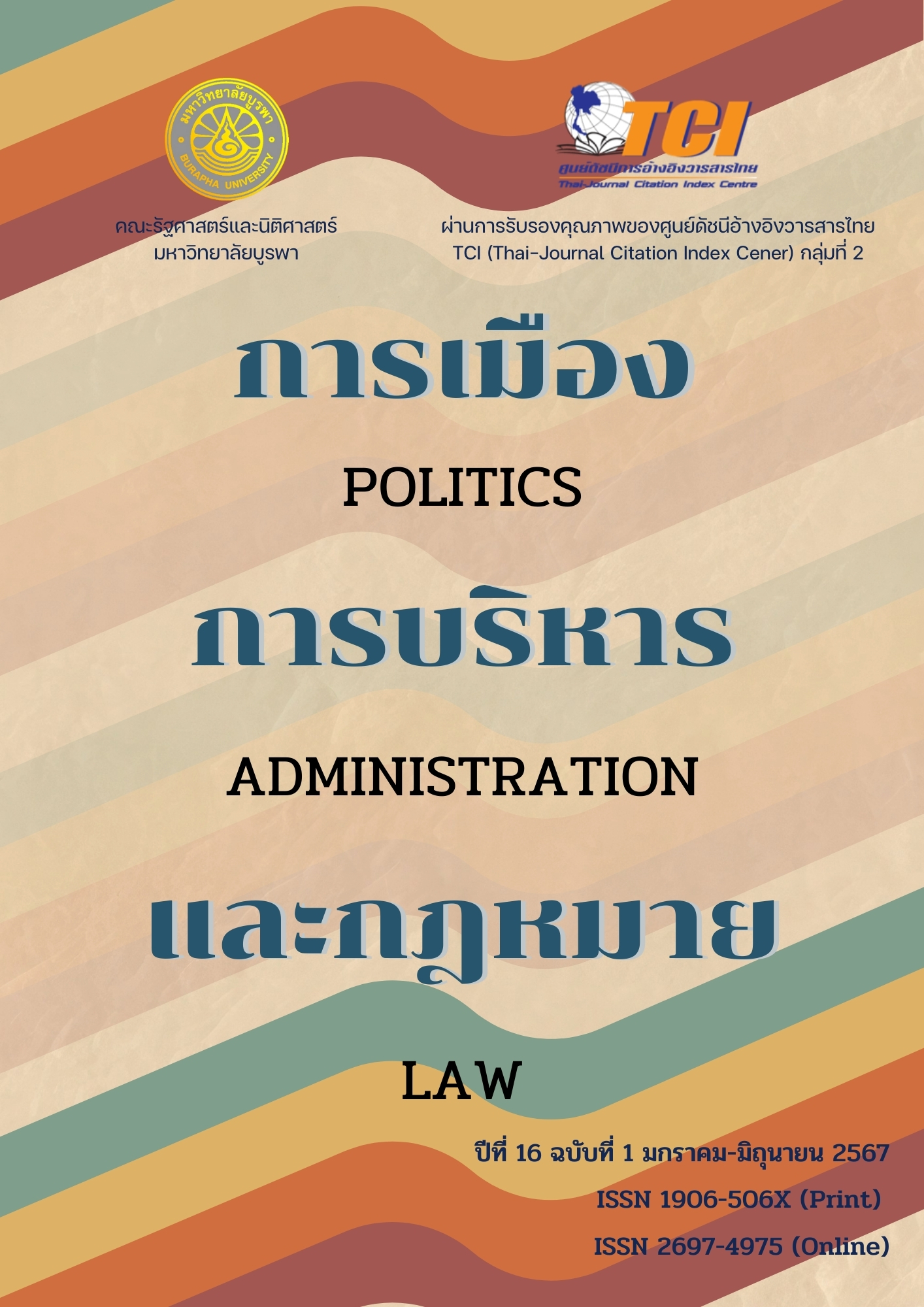การวิเคราะห์ความขัดแย้งทางด้านการเมืองที่มาจากความแตกต่างระหว่างช่วงวัย
คำสำคัญ:
เจเนอเรชั่น, วัฒนธรรมทางการเมือง, การเมือง, การเลือกตั้งบทคัดย่อ
ความแตกต่างของแต่ละช่วงวัย (Generation) อาจจะส่งผลหลายอย่างในการใช้ชีวิตร่วมกันของคนในสังคมที่มาจากการเติบโตหรือการเลี้ยงดูและสภาพแวดล้อมที่ไม่เหมือนกัน ส่งผลให้ความคิด ความรู้สึก พฤติกรรมในการใช้ชีวิตมีความแตกต่างกันออกไป ประกอบกับสถานการณ์ปัจจุบันทางการเมืองที่เข้ามามีบทบาทกับทุกชีวิตของทุกคนในสังคม ส่งผลให้มุมมองทางการเมืองเปลี่ยนไปตามแต่ละช่วงวัยเช่นกัน จนก่อเกิดเป็นความขัดแย้งจากที่เห็นในปัจจุบันที่มีการเรียกร้องของกลุ่มคนรุ่นใหม่ที่ไม่เห็นด้วยกับความคิดทางการเมืองในรูปแบบเดิมที่คนรุ่นเก่าที่ยังคงยึดติดกับกรอบความคิดที่ยังมีความล้าสมัย ซึ่งมีความแตกต่างจากคนรุ่นใหม่ที่มีความคิดที่แตกออกไปจากมุมมองด้านเมืองในอดีตที่ผ่านมา กลุ่มคนเหล่านี้เติบโตมาพร้อมกับการเปลี่ยนแปลงของสภาพการเมืองที่ส่งผลกระทบกับการดำเนินชีวิตของคนกลุ่มนี้ เห็นได้จากการแสดงออกทางการเมืองอยู่บ่อยครั้ง จนทำให้เกิดความขัดแย้งขึ้นในสังคม จากกรณีการศึกษาความขัดแย้งระหว่างช่วงวัยที่ทำให้เกิดความแตกต่างทางความคิดด้านการเมืองนั้น พบว่าสิ่งที่ควรให้ความสำคัญที่สุดคือการยอมรับและเข้าใจในความแตกต่างซึ่งกันและกัน เพื่อให้ทุกคนในสังคมอยู่ร่วมกันได้อย่างมีความสุข โดยในบทความนี้ผู้เขียนได้เสนอเป็น 2 ทางออกในการแก้ไขปัญหา ที่สอดคล้องวัฒนธรรมทางการเมืองโดยกระบวนปลูกฝังอบรมกล่องเกลาทางการเมืองผ่านสถาบันครอบครัว และสถาบันการศึกษาอีกด้วย
เอกสารอ้างอิง
กนกรัตน์ เลิศชูสกุล. (2564). สงครามเย็น (ใน) ระหว่างโบว์ขาว. กรุงเทพฯ: สำนักพิมพ์มติชน.
กานต์พิชชา เก่งการช่าง. (2556). เจนเนอเรชั่นวายกับความท้าทายใหม่ในการบริหารทรัพยากรบุคคล. วารสารสังคมศาสตร์และศิลปศาสตร์, มหาวิทยาลัยเกษตรศาสตร์, 2(1), 15-16.
โกวิท วงศ์สุรวัฒน์. (2557). เจนวายคืออะไร. วันที่ค้นข้อมูล 22 ตุลาคม 2566, เข้าถึงได้จาก https://goo.gl/KouW13
แฟลชม็อบนักศึกษา ถึง ชุมนุมใหญ่ของ "คณะราษฎร 2563" ลำดับเหตุการณ์ชุมนุมทางการเมืองปี 2563. (2563). วันที่ค้นข้อมูล 22 ตุลาคม 2566, เข้าถึงได้จาก https://www.bbc.com/thai/thailand-54741254
ลิขิต ธีรเวคิน. (2529). ขอบข่ายและวิธีการศึกษารัฐศาสตร์. กรุงเทพฯ: สำนักพิมพ์สามศาสตร์.
วสะ บูรพาเดชะ และอนันต์ โอสถศิลป์. (2563). การวิเคราะห์ความแตกต่างของความคิดและทัศนคติทางการเมืองระหว่างประชากรต่างช่วงวัย. รายงานการวิจัย, มหาวิทยาลัยอัสสัมชัญ.
ศรีกัญญา มงคลศิริ. (2548). Power gens branding. กรุงเทพฯ: พิฆเณศ พริ้นติ้ง เซ็นเตอร์.
ศิริสุดา แสงทอง. (2564). ความตื่นตัวทางการเมืองของคนรุ่นใหม่: จุดยืนประชาธิปไตยใหม่แห่งอนาคต. วารสารมหาจุฬานาครทรรศน์, 8(2).
สถาบันวิจัยประชากรและสังคม มหาวิทยาลัยมหิดล. (2563). ม็อบการเมืองคนรุ่นใหม่: จากแฟลชม็อบสู่คณะราษฎร 2563. วันที่ค้นข้อมูล 22 ตุลาคม 2566, เข้าถึงได้จาก https://www.thaihealthreport.com/th/situation_ten.php?id=41&y=2564&bm=6
สมบัติ ธำรงธัญวงศ์. (2549). การเมืองไทย. กรุงเทพฯ: สำนักพิมพ์เสมาธรรม.
สรรเพชญ ไชยสิริยะสวัสดิ์. (2557). สแกนคน 4 เจเนอเรชั่น. วันที่ค้นข้อมูล 22 ตุลาคม 2566, เข้าถึงได้จากhttp://swis.acp.ac.th/html_edu/acp/temp_informed/1514.pdf
อรวรรณ สว่างอารมณ์. (2563). การศึกษาวัฒนธรรมทางการเมืองของพลเมือง 4 รุ่น: กรณีศึกษาอำเภอวังน้อย จังหวัดพระนครศรีอยุธยา. วิทยานิพนธ์ศิลปศาสตรมหาบัณฑิต, คณะพัฒนาสังคมและสิ่งแวดล้อม, สถาบันบัณฑิตพัฒนบริหารศาสตร์.
อรวรรณ สว่างอารมณ์. (2563). การศึกษาวัฒนธรรมทางการเมืองของพลเมือง 4 รุ่น: กรณีศึกษาอำเภอวังน้อย จังหวัดพระนครศรีอยุธยา. วารสารพัฒนาสังคม คณะพัฒนาสังคมและสิ่งแวดล้อม สถาบันบัณฑิตพัฒนบริหารศาสตร์, 23(1).
อรรถสิทธิ์ พานแก้ว. (2562). คนรุ่นใหม่. วันที่ค้นข้อมูล 22 ตุลาคม 2566, เข้าถึงได้จาก http://wiki.kpi.ac.th/index.php?title=คนรุ่นใหม่
ดาวน์โหลด
เผยแพร่แล้ว
ฉบับ
ประเภทบทความ
สัญญาอนุญาต

อนุญาตภายใต้เงื่อนไข Creative Commons Attribution-NonCommercial-NoDerivatives 4.0 International License.






